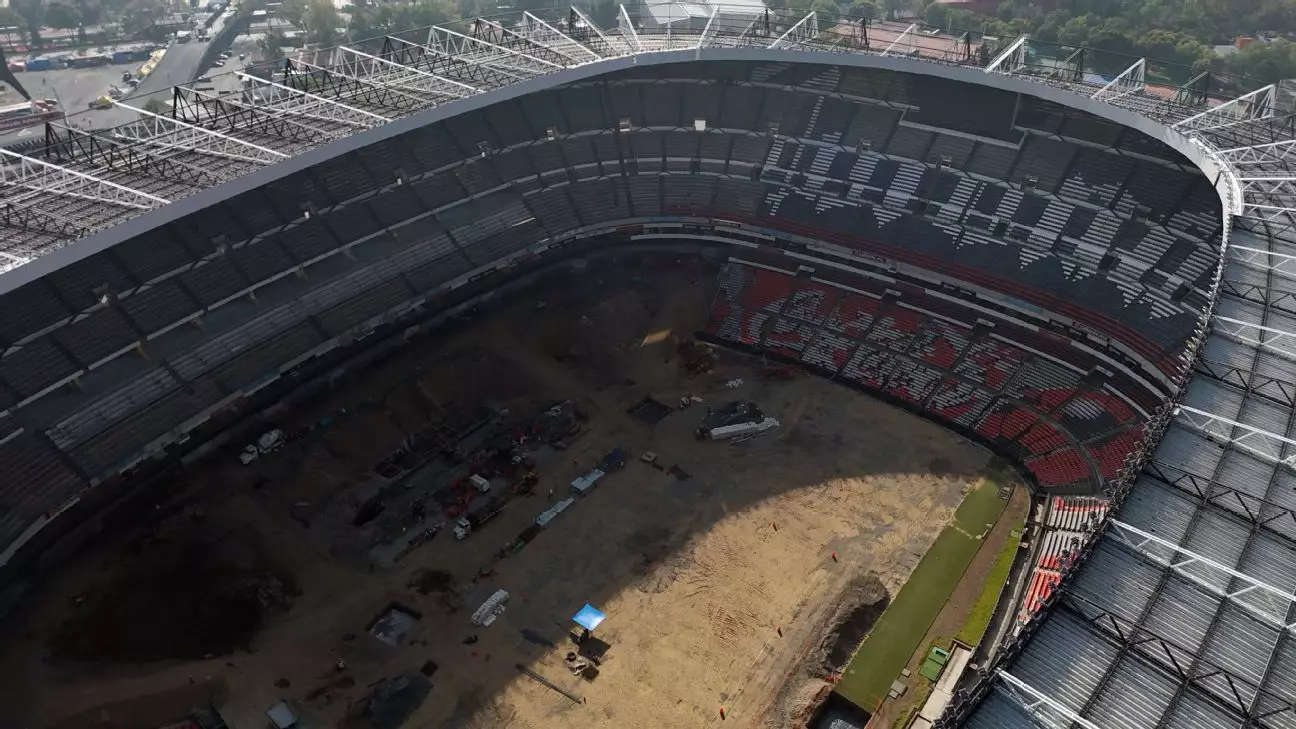As the 2026 FIFA World Cup approaches, the eyes of the world are increasingly focused on the preparation activities taking place in host countries, particularly in Mexico’s iconic Azteca Stadium. However, a troubling standoff has emerged between labor organizations and FIFA, raising significant concerns about worker safety and rights amidst the backdrop of grand sporting events. Ambet Yuson, the general secretary of the Building and Wood Workers’ International (BWI), recently reported that FIFA denied access to the stadium for independent inspections. This refusal to allow oversight not only questions FIFA’s commitment to labor rights but also exposes an unsettling reality for construction workers involved in the renovations that are vital for this global spectacle.
The Ominous Shadow of Poor Labor Practices
This issue transcends contractual obligations or bureaucratic tangles; it touches on the fundamental human rights of workers. Yuson’s statement underscored a glaring disparity: FIFA asserted that oversight was unnecessary since the local workforce is unionized and there have been no reported incidents thus far. Yet, the precarious nature of construction work—especially in a country where only 7% of workers are affiliated with unions—poses unavoidable risks. In the past, construction workers have faced dire working conditions during major events, leading to avoidable injuries and fatalities. The BWI’s past experiences in inspecting conditions for FIFA and Olympic events have shown a pattern that cannot be ignored.
Global Standards vs. Local Reality
The contrasting claims of FIFA and the BWI highlight a critical gap between professed international labor standards and the local realities faced by workers. Ambet Yuson aptly reminded the world that the World Cup is a global event that should adhere to global standards. With FIFA’s position that it does not manage construction, it skirts responsibility while simultaneously claiming to champion worker rights. This dissonance raises crucial questions: If FIFA truly seeks to uphold international labor standards, why does it shy away from independent scrutiny? By refusing inspections, FIFA is not merely denying access; it is undermining the accountability needed to ensure that workers are safe and treated with dignity.
The Historic Importance of Azteca Stadium
The Azteca Stadium holds a unique place in football history. Not only will it be the first venue to host three World Cup opening matches, but it also marks the stadium’s third time serving as a World Cup location, having hosted the tournaments in both 1970 and 1986. As a symbol of football culture, it commands respect and recognition on a global scale, but that cultural capital should not overshadow the human cost of its renovations. The legacy associated with the Azteca Stadium should not come at the expense of the workers tasked with preparing it for this prestigious event.
A Call for Accountability and Change
The call for independent inspections reinforces the growing movement toward labor accountability, particularly as it pertains to mega-events. Construction workers are the backbone of these monumental undertakings; ensuring their rights and safety should be paramount. BWI’s assertion that it has monitored working conditions at major international events anchors this dialogue in urgency and necessity. FIFA’s withdrawal from an agreement for joint inspections further complicates an already hazardous situation. An independent body must oversee working conditions to mitigate risks and uphold ethical labor practices.
Making a Choice: Ethics Over Profit
Sports and ethics are often seen as mutually exclusive, particularly in the realm of commercialized mega-events that can prioritize profit margins over human lives. However, this mindset needs to change. As global citizens, we must advocate for labor rights and safety, understanding that the spirit of sport fundamentally relies on the dignity of its participants—both players and workers. FIFA’s insistence on autonomy should not come at the peril of construction workers; the organization must address its responsibilities and engage transparently rather than attempting to sidestep scrutiny.
As preparations for the 2026 World Cup unfold, the alarming issues surrounding labor conditions at the Azteca Stadium represent a critical juncture. The very essence of sports lies in fair play, extending not only to the athletes on the field but also to every individual who contributes to the event’s success behind the scenes. It is time for organizations like FIFA to embrace their role as stewards of labor rights, ensuring that the grandeur of global events does not eclipse the humanity of its workers.

